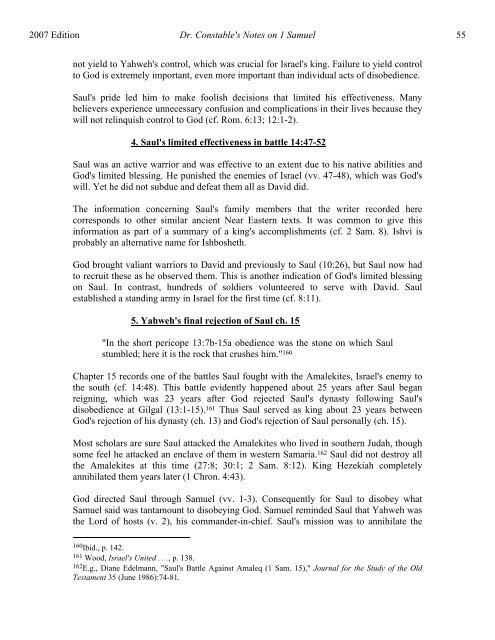1 Samuel - Odessa, Missouri Community of Christ
1 Samuel - Odessa, Missouri Community of Christ
1 Samuel - Odessa, Missouri Community of Christ
You also want an ePaper? Increase the reach of your titles
YUMPU automatically turns print PDFs into web optimized ePapers that Google loves.
2007 Edition Dr. Constable's Notes on 1 <strong>Samuel</strong> 55not yield to Yahweh's control, which was crucial for Israel's king. Failure to yield controlto God is extremely important, even more important than individual acts <strong>of</strong> disobedience.Saul's pride led him to make foolish decisions that limited his effectiveness. Manybelievers experience unnecessary confusion and complications in their lives because theywill not relinquish control to God (cf. Rom. 6:13; 12:1-2).4. Saul's limited effectiveness in battle 14:47-52Saul was an active warrior and was effective to an extent due to his native abilities andGod's limited blessing. He punished the enemies <strong>of</strong> Israel (vv. 47-48), which was God'swill. Yet he did not subdue and defeat them all as David did.The information concerning Saul's family members that the writer recorded herecorresponds to other similar ancient Near Eastern texts. It was common to give thisinformation as part <strong>of</strong> a summary <strong>of</strong> a king's accomplishments (cf. 2 Sam. 8). Ishvi isprobably an alternative name for Ishbosheth.God brought valiant warriors to David and previously to Saul (10:26), but Saul now hadto recruit these as he observed them. This is another indication <strong>of</strong> God's limited blessingon Saul. In contrast, hundreds <strong>of</strong> soldiers volunteered to serve with David. Saulestablished a standing army in Israel for the first time (cf. 8:11).5. Yahweh's final rejection <strong>of</strong> Saul ch. 15"In the short pericope 13:7b-15a obedience was the stone on which Saulstumbled; here it is the rock that crushes him." 160Chapter 15 records one <strong>of</strong> the battles Saul fought with the Amalekites, Israel's enemy tothe south (cf. 14:48). This battle evidently happened about 25 years after Saul beganreigning, which was 23 years after God rejected Saul's dynasty following Saul'sdisobedience at Gilgal (13:1-15). 161 Thus Saul served as king about 23 years betweenGod's rejection <strong>of</strong> his dynasty (ch. 13) and God's rejection <strong>of</strong> Saul personally (ch. 15).Most scholars are sure Saul attacked the Amalekites who lived in southern Judah, thoughsome feel he attacked an enclave <strong>of</strong> them in western Samaria. 162 Saul did not destroy allthe Amalekites at this time (27:8; 30:1; 2 Sam. 8:12). King Hezekiah completelyannihilated them years later (1 Chron. 4:43).God directed Saul through <strong>Samuel</strong> (vv. 1-3). Consequently for Saul to disobey what<strong>Samuel</strong> said was tantamount to disobeying God. <strong>Samuel</strong> reminded Saul that Yahweh wasthe Lord <strong>of</strong> hosts (v. 2), his commander-in-chief. Saul's mission was to annihilate the160 Ibid., p. 142.161 Wood, Israel's United . . ., p. 138.162 E.g., Diane Edelmann, "Saul's Battle Against Amaleq (1 Sam. 15)," Journal for the Study <strong>of</strong> the OldTestament 35 (June 1986):74-81.








